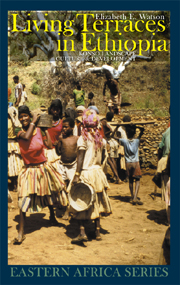Book contents
- Frontmatter
- Contents
- List of Photographs
- List of Maps, Tables & Figures
- Acknowledgements
- Foreword
- Introduction: Konso Landscape, Culture & Development
- 1 Konso Intensive Indigenous Agriculture
- 2 Social Life of Agriculture
- 3 Ritual Life of Agriculture
- 4 Political Life of Agriculture
- 5 Modernity & Christianity
- 6 Revolutionary State
- 7 Ethnic Decentralization & Self-determination
- Conclusion: Landscape, Meaning & Development
- References
- Index
3 - Ritual Life of Agriculture
Published online by Cambridge University Press: 12 September 2012
- Frontmatter
- Contents
- List of Photographs
- List of Maps, Tables & Figures
- Acknowledgements
- Foreword
- Introduction: Konso Landscape, Culture & Development
- 1 Konso Intensive Indigenous Agriculture
- 2 Social Life of Agriculture
- 3 Ritual Life of Agriculture
- 4 Political Life of Agriculture
- 5 Modernity & Christianity
- 6 Revolutionary State
- 7 Ethnic Decentralization & Self-determination
- Conclusion: Landscape, Meaning & Development
- References
- Index
Summary
The world becomes apprehensible as a world, as cosmos, in the measure in
which it reveals itself as a sacred world (Eliade, 1957: 64).
The poqallas' control over larger amounts of land gives them access to more labour, which allows them to invest in the construction of the landesque capital. As institutions, the poqallas are structures of power, and the material presented in the previous chapter suggests that their power is derived mainly from their economic control, and that a poqalla can be perceived as a kind of landlord. The revolutionary Derg government certainly took this view when it assumed power in 1974, and accused many poqallas of being landlords who exploited the people. The extent to which the poqallas can be justifiably viewed as landlords is examined in more detail in Chapter Four; Chapter Six looks at the way in which these government assumptions impacted upon the position and role of the poqalla after the revolution. In this chapter, I examine the nature of the different exchanges between the poqallas and others in the community and the way in which they go far beyond the realm of the economic. In the literature, the poqallas have first and foremost been understood as sacred ritual leaders or priests, and it is this aspect I consider here. This chapter argues that the ritual role of the poqalla is as important to the production of Konso landscapes and livelihoods as the economic role, and that the ritual and the economic cannot be separated.
- Type
- Chapter
- Information
- Living Terraces in EthiopiaKonso Landscape, Culture and Development, pp. 80 - 110Publisher: Boydell & BrewerPrint publication year: 2009



